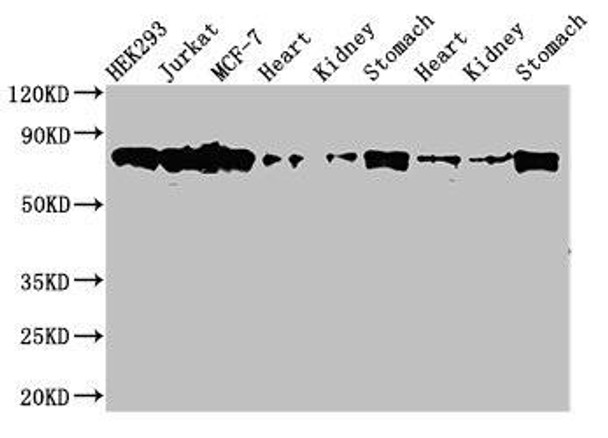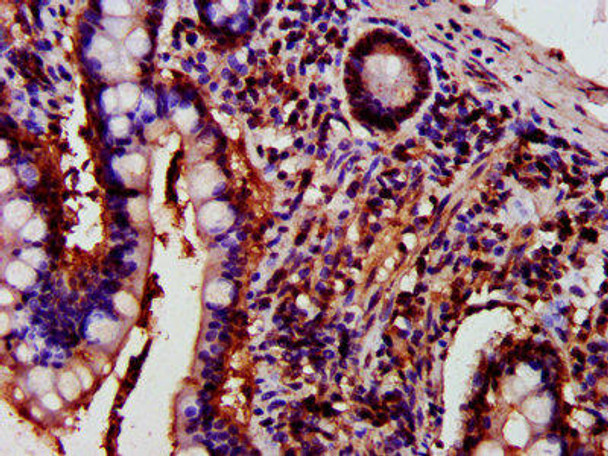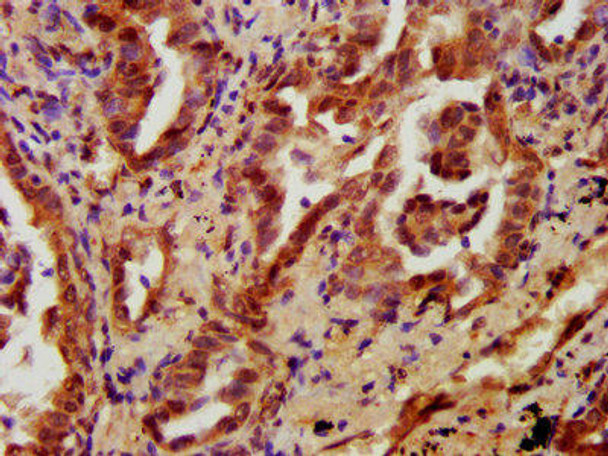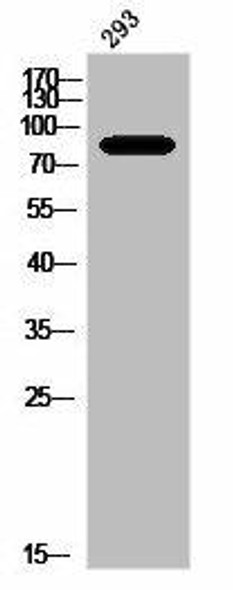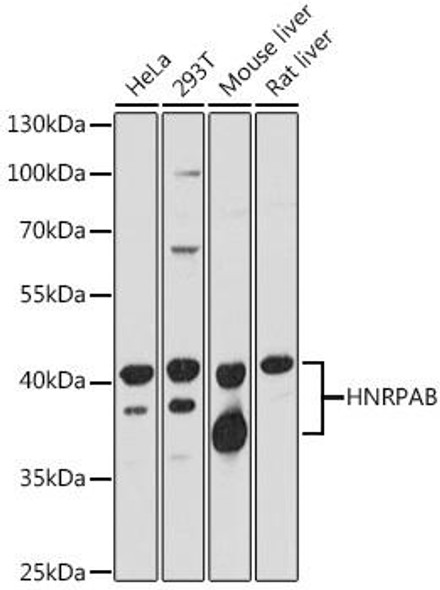PRKCH Antibody (PACO33648)
- SKU:
- PACO33648
- Product Type:
- Antibody
- Reactivity:
- Human
- Mouse
- Rat
- Host Species:
- Rabbit
- Isotype:
- IgG
- Applications:
- ELISA
- WB
- IHC
- Antibody Type:
- Polyclonal Antibody
- Conjugation:
- Unconjugated
Description
PRKCH Antibody (PACO33648)
The PRKCH Polyclonal Antibody (PAC033648) is a valuable tool for researchers studying the PRKCH protein, which plays a key role in various cellular processes, including immune response and cell signaling. This antibody, produced in rabbits, is highly specific for human samples and has been validated for use in Western blot applications. It binds specifically to the PRKCH protein, allowing for the detection and analysis of PRKCH in different cell types and tissues, making it ideal for studies in immunology and cancer research.PRKCH, also known as protein kinase C eta, is involved in the regulation of immune responses, cell proliferation, and apoptosis.
Its dysregulation has been implicated in various diseases, including cancer, autoimmune disorders, and inflammatory conditions. By understanding the role of PRKCH in these processes, researchers can develop targeted therapies for treating these conditions and potentially improving patient outcomes.Overall, the PRKCH Polyclonal Antibody is a valuable tool for researchers looking to investigate the function of PRKCH in different biological contexts and diseases, ultimately contributing to the development of new therapeutic strategies.
| Antibody Name: | PRKCH Antibody (PACO33648) |
| Antibody SKU: | PACO33648 |
| Size: | 50ug |
| Host Species: | Rabbit |
| Tested Applications: | ELISA, WB, IHC |
| Recommended Dilutions: | ELISA:1:2000-1:10000, WB:1:500-1:5000, IHC:1:500-1:1000 |
| Species Reactivity: | Human, Mouse, Rat |
| Immunogen: | Recombinant Human Protein kinase C eta type protein (1-678AA) |
| Form: | Liquid |
| Storage Buffer: | Preservative: 0.03% Proclin 300 Constituents: 50% Glycerol, 0.01M PBS, PH 7.4 |
| Purification Method: | >95%, Protein G purified |
| Clonality: | Polyclonal |
| Isotype: | IgG |
| Conjugate: | Non-conjugated |
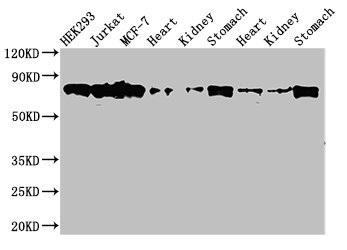 | Western Blot Positive WB detected in: HEK293 whole cell lysate, Jurkat whole cell lysate, MCF-7 whole cell lysate, Rat heart tissue, Rat kideny tissue, Rat stomach tissue, Mouse heart tissue, Mouse kidney tissue, Mouse stomach tissue All lanes: PRKCH antibody at 3.5µg/ml Secondary Goat polyclonal to rabbit IgG at 1/50000 dilution Predicted band size: 78, 60 kDa Observed band size: 78 kDa . |
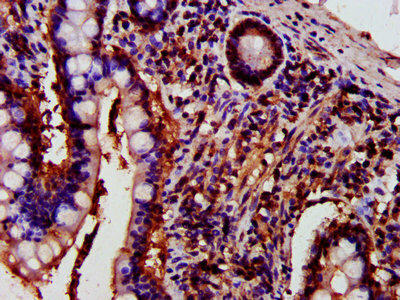 | IHC image of PACO33648 diluted at 1:700 and staining in paraffin-embedded human small intestine tissue performed on a Leica BondTM system. After dewaxing and hydration, antigen retrieval was mediated by high pressure in a citrate buffer (pH 6.0). Section was blocked with 10% normal goat serum 30min at RT. Then primary antibody (1% BSA) was incubated at 4°C overnight. The primary is detected by a biotinylated secondary antibody and visualized using an HRP conjugated SP system. |
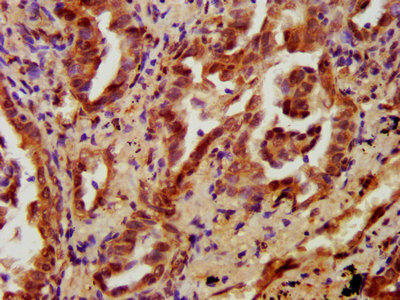 | IHC image of PACO33648 diluted at 1:700 and staining in paraffin-embedded human lung cancer performed on a Leica BondTM system. After dewaxing and hydration, antigen retrieval was mediated by high pressure in a citrate buffer (pH 6.0). Section was blocked with 10% normal goat serum 30min at RT. Then primary antibody (1% BSA) was incubated at 4°C overnight. The primary is detected by a biotinylated secondary antibody and visualized using an HRP conjugated SP system. |
| Background: | Calcium-independent, phospholipid- and diacylglycerol (DAG)-dependent serine/threonine-protein kinase that is involved in the regulation of cell differentiation in keratinocytes and pre-B cell receptor, mediates regulation of epithelial tight junction integrity and foam cell formation, and is required for glioblastoma proliferation and apoptosis prevention in MCF-7 cells. In keratinocytes, binds and activates the tyrosine kinase FYN, which in turn blocks epidermal growth factor receptor (EGFR) signaling and leads to keratinocyte growth arrest and differentiation. Associates with the cyclin CCNE1-CDK2-CDKN1B complex and inhibits CDK2 kinase activity, leading to RB1 dephosphorylation and thereby G1 arrest in keratinocytes. In association with RALA activates actin depolymerization, which is necessary for keratinocyte differentiation. In the pre-B cell receptor signaling, functions downstream of BLNK by up-regulating IRF4, which in turn activates L chain gene rearrangement. Regulates epithelial tight junctions (TJs) by phosphorylating occludin (OCLN) on threonine residues, which is necessary for the assembly and maintenance of TJs. In association with PLD2 and via TLR4 signaling, is involved in lipopolysaccharide (LPS)-induced RGS2 down-regulation and foam cell formation. Upon PMA stimulation, mediates glioblastoma cell proliferation by activating the mTOR pathway, the PI3K/AKT pathway and the ERK1-dependent phosphorylation of ELK1. Involved in the protection of glioblastoma cells from irradiation-induced apoptosis by preventing caspase-9 activation. In camptothecin-treated MCF-7 cells, regulates NF-kappa-B upstream signaling by activating IKBKB, and confers protection against DNA damage-induced apoptosis. Promotes oncogenic functions of ATF2 in the nucleus while blocking its apoptotic function at mitochondria. Phosphorylates ATF2 which promotes its nuclear retention and transcriptional activity and negatively regulates its mitochondrial localization. |
| Synonyms: | Protein kinase C eta type (EC 2.7.11.13) (PKC-L) (nPKC-eta), PRKCH, PKCL PRKCL |
| UniProt Protein Function: | PKCH: Calcium-independent, phospholipid- and diacylglycerol (DAG)-dependent serine/threonine-protein kinase that is involved in the regulation of cell differentiation in keratinocytes and pre-B cell receptor, mediates regulation of epithelial tight junction integrity and foam cell formation, and is required for glioblastoma proliferation and apoptosis prevention in MCF-7 cells. In keratinocytes, binds and activates the tyrosine kinase FYN, which in turn blocks epidermal growth factor receptor (EGFR) signaling and leads to keratinocyte growth arrest and differentiation. Associates with the cyclin CCNE1-CDK2-p27Kip1 complex and inhibits CDK2 kinase activity, leading to RB1 dephosphorylation and thereby G1 arrest in keratinocytes. In association with RALA activates actin depolymerization, which is necessary for keratinocyte differentiation. In the pre-B cell receptor signaling, functions downstream of BLNK by up-regulating IRF4, which in turn activates L chain gene rearrangement. Regulates epithelial tight junctions (TJs) by phosphorylating occludin (OCLN) on threonine residues, which is necessary for the assembly and maintenance of TJs. In association with PLD2 and via TLR4 signaling, is involved in lipopolysaccharide (LPS)-induced RGS2 down-regulation and foam cell formation. Upon PMA stimulation, mediates glioblastoma cell proliferation by activating the mTOR pathway, the PI3K/AKT pathway and the ERK1- dependent phosphorylation of ELK1. Involved in the protection of glioblastoma cells from irradiation-induced apoptosis by preventing caspase-9 activation. In camptothecin-treated MCF-7 cells, regulates NF-kappa-B upstream signaling by activating IKBKB, and confers protection against DNA damage-induced apoptosis. Interacts with FYN and RALA. Interacts with DGKQ. Most abundant in lung, less in heart and skin. Novel PKCs (PRKCD, PRKCE, PRKCH and PRKCQ) are calcium-insensitive, but activated by diacylglycerol (DAG) and phosphatidylserine. Three specific sites; Thr-513 (activation loop of the kinase domain), Thr-656 (turn motif) and Ser-675 (hydrophobic region), need to be phosphorylated for its full activation. Belongs to the protein kinase superfamily. AGC Ser/Thr protein kinase family. PKC subfamily. |
| UniProt Protein Details: | Protein type:Kinase, protein; Protein kinase, Ser/Thr (non-receptor); Protein kinase, AGC; EC 2.7.11.13; AGC group; PKC family; Eta subfamily Chromosomal Location of Human Ortholog: 14q23.1 Cellular Component: cytoplasm; cytosol; plasma membrane Molecular Function:enzyme binding; protein kinase C activity Biological Process: activation of NF-kappaB transcription factor; peptidyl-serine phosphorylation; platelet activation; positive regulation of B cell receptor signaling pathway; positive regulation of keratinocyte differentiation; protein amino acid phosphorylation; signal transduction Disease: Stroke, Ischemic |
| NCBI Summary: | Protein kinase C (PKC) is a family of serine- and threonine-specific protein kinases that can be activated by calcium and the second messenger diacylglycerol. PKC family members phosphorylate a wide variety of protein targets and are known to be involved in diverse cellular signaling pathways. PKC family members also serve as major receptors for phorbol esters, a class of tumor promoters. Each member of the PKC family has a specific expression profile and is believed to play a distinct role in cells. The protein encoded by this gene is one of the PKC family members. It is a calcium-independent and phospholipids-dependent protein kinase. It is predominantly expressed in epithelial tissues and has been shown to reside specifically in the cell nucleus. This protein kinase can regulate keratinocyte differentiation by activating the MAP kinase MAPK13 (p38delta)-activated protein kinase cascade that targets CCAAT/enhancer-binding protein alpha (CEBPA). It is also found to mediate the transcription activation of the transglutaminase 1 (TGM1) gene. Mutations in this gene are associated with susceptibility to cerebral infarction. [provided by RefSeq, Sep 2015] |
| UniProt Code: | P24723 |
| NCBI GenInfo Identifier: | 281185512 |
| NCBI Gene ID: | 5583 |
| NCBI Accession: | P24723.4 |
| UniProt Secondary Accession: | P24723,Q16246, Q8NE03, B4DJN5, |
| UniProt Related Accession: | P24723 |
| Molecular Weight: | 59,521 Da |
| NCBI Full Name: | Protein kinase C eta type |
| NCBI Synonym Full Names: | protein kinase C eta |
| NCBI Official Symbol: | PRKCH |
| NCBI Official Synonym Symbols: | PKCL; PKC-L; PRKCL; nPKC-eta |
| NCBI Protein Information: | protein kinase C eta type |
| UniProt Protein Name: | Protein kinase C eta type |
| UniProt Synonym Protein Names: | PKC-L; nPKC-eta |
| Protein Family: | Protein kinase |
| UniProt Gene Name: | PRKCH |
| UniProt Entry Name: | KPCL_HUMAN |

